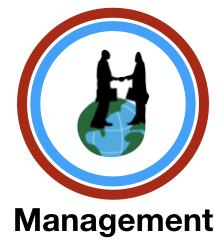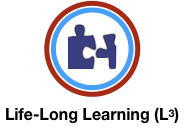
Our consulting and writing activities encompass three broad Types of knowledge and general Classes within those knowledge areas:
- Management
- Functions
- Sectors
- Soft skills
- Science-Technology
- Basic
- Applied
- Life-Long Learning (L3)
- Humanities
- Applied
We segment each Class into the Disciplines shown in the right sidebar. Here is the hierarchy of this site’s Knowledge content.
- Type of Knowledge (e.g. Management)
- Class of Knowledge (e.g. Function)
- Discipline within the knowledge class (e.g. Business Intelligence)
- Subject (e.g. Market Research – not shown in sidebar)
- Discipline within the knowledge class (e.g. Business Intelligence)
- Class of Knowledge (e.g. Function)
Each discipline, of course, has multiple subjects and sub-subjects. We’re sparing you endlessly scrolling a sidebar with multiple sub-menus. Instead, type keywords in the search box to locate specific subject areas at this site.
NOTE: There are many different classification schemes (taxonomies) for organizing branches of knowledge. We developed this system to simplify your search for the knowledge and information presented at this site.
The disciplines within the three broad Management classes are listed in alphabetical order to help you locate more easily those you’re interested in. The Functions discipline list incorporates the areas covered by most business plans. The Sectors list is taken from the NAICS (North American Industry Classification System), which is structured by industry. The Soft Skills list includes some important personal characteristics that contribute to an individual’s success.
Science-Technology is divided into Basic and Applied subjects and are listed in the order traditionally used in this area. Likewise with the Life-Long Learning branch.
Each discipline links to an Index, which links to titles of specific articles and other medi. Before you start clicking, though, check out the short definitions below for a quick reference guide.

Management
Not limited to business, hard and soft management skills may be applied to other types of enterprises, and even to family, social and other types of activities. The following list offers our own brief definitions of these activities. We’ve tried to avoid definitions using the word being defined (not always a simple task!).
- FUNCTIONS. Activities of an enterprise, other entity, or even an individual.
- Business Intelligence. Analysis of business information to support decision-making.
- Ethics Policies, Practices. Moral principles or code of conduct to guide behavior.
- Finance. Management of money and other assets easily convertible to cash.
- Globalization. Operating in, or influencing, international (cross-border) trade, policies and societies.
- Instruction. Providing instruction, coaching and other information relevant to an individual or group.
- Management of Money. Process of overseeing an entity’s financial activities, such as budgeting and investing.
- Marketing. Activities undertaken to promote the selling and buying of goods and services.
- New Products. Goods and services that differ in features or use from those previously produced.
- Operations. Business practices that keep an organization working in a productive, efficient manner.
- R&D. Activities undertaken to create new, or improve exisitng, products and services.
- Strategy Development. Process of developing options for planning roadmap for reaching defined goals and objectives.
- Technology. Applying scientific knowledge for practical purposes.
- SECTORS. Segments of an economy. Includes, but not limited to, industries.
- Agriculture. Activities related to cultivating land and raising livestock for food and other products.
- Arts. Creative activities that produce and express works appealing to the senses of emotions.
- Construction. The work of building or making structures, infrastructure (e.g. roads, sewers and other “public works” systems), or other large objects.
- Education. Schools and other institutions providing systematic instruction on various subjects of value to its participants.
- Finance. Economic service providers such as banks and brokers, plus the markets and other instruments enabling the management of money.
- Health Care. Institutions and systems providing goods and services to support and treat the needs of patients.
- Information. Entities engaged in producing, processing and distributing facts, data and a wide range of communications media.
- Lodging, Food Services. Establishments providing accommodation and/or preparing food and beverages for immediate consumption.
- Management of Enterprises. Providing services for other entities that could do them in-house but find outsourcing less expensive because services are aggregated and savings passed on to those entities.
- Manufacturing. Makers of a vast spectrum of products through transformation of materials, substances, or components into new products.
- Mining, Extraction. Establishments that extract naturally occuring minerals in solid or liquid form, and gases.
- Professional Services. Establishments specializing in performing skilled activities for industrial and consumer clients.
- Public Administration. Federal, state, and local government agencies that administer, oversee, and manage public programs.
- Real Estate. Buyers, sellers and leasing agents of residential, commercial and industrial properties.
- Retail Trade. Establishments engaged in selling goods or services to customers through multiple channels and rendering services relating to those sales.
- Services, except Pub. Admin. These are “all other” services not elsewhere classified, such as drycleaning, pet care and equipment repairing.
- Transportation, Warehousing. Establishments conveying people and products, such as railroads; storage for goods and support services.
- Utilities. Companies providing water, electrcity, natural gas and other basic infrastructure services.
- Waste Management. Establishment engaged in the collection, treatment, and dispossal of refuse and unwanted material.
- Wholesale Trade. Firms selling to businesses, governments and entities who resell to other entities, such as retailers.
- SOFT SKILLS. These are personal, character traits that may be inherent but can also be learned.
- Change Navigation. Ability to adapt successfully to altered circumstances.
- Communication. Method of transferring information from an individual or group to another individual or group.
- Entrepreneurship. Activity of establishing a new entity, whether for business and profit or for social good.
- Partnering. Developing strategic, long-term relationships for achieving positive synergy.
- People. Ability to interact with others in a mutually-productive, effective way.
- Personal Attributes. Positive qualities that indicate current and potential success in an individual’s endeavors.
- Philosophy. Personal beliefs regarding values, behaviors and thinking.

Science-Technology
The laws of nature are pretty much inescapable, albeit frequently invisible. All of us can improve the efficiency and effectiveness of our activities on this planet by understanding and leveraging the power of these laws. Reviews and Blogs represent most of the content in this category. Many Science-Technology blog items originate on BioFables, our sister site.
Opinions differ on whether Math, Earth and Space sciences are Basic, Applied, or Hybrid (that is, cross-disciplinary). We chose to take the simplest, rather than academic, path by placing these top-level science disciplnes into either Basic or Applied; we’ve categorized Social Science, or Sociology (our preferred term) as a branch of Humanities.
- BASIC. Activities that expand knowledge, regardless of short-term practical use.
- Biology. Science of all forms and circumstances of life and living organisms.
- Chemistry. Science of forms and properties of matter, its substances, and processes of interactions that cause new substances to form.
- Physics. Science of matter, energy, motion and force.
- Math. Science of numbers, quantities, shapes, patterns, and the relationships between and among them.
- APPLIED. Techniques that have immediate, practical use.
- Earth Science. Natural science related to planet Earth and its atmosphere.
- Space Science. Disciplines that study Earth’s upper atmosphere and beyond, including natural phenomena, physical bodies (e.g. planets and stars), and exploration and travel in these realms.
- IT (Information Technology). Use of computers and other devices to store, transmit and manipulate data or other intelligence.
- Technology. Application of scientific knowledge, which includes methods, systems, tools, and machines to find answers and to fix problems.
- Engineering. Using science and math to design, make and repair things and to solve technical problems.

Life-Long Learning (L3)
You’re never too old (or too young!) to improve your understanding, meaning, and opportunities of life through analyzing your observations, experimentations.
- HUMANITIES Study of human culture, including processes.
- Sociology. Increased understanding of society, institutions, relationships and behaviors.
- Language. Means of effective communication, spoken or written. Includes grammar, logic and rhetoric
- Philosophy. Ways of thinking about the world, expanded by knowledge of a broad spectrum of respected ancient through contemporary wisdom.
- History. Knowledge of past events through stories and records. “Those who do not learn history are doomed to repeat it.”
- Fine, Liberal Arts. Creative production of human activity expressed through visual, hearing, touch and other sense for the purpose of self satisfaction or to elicit intellectual or emotional responses in others. Includes music, literature, sculpture, architecture, painting, theater and film.
- APPLIED SKILLS. Practical abilities to survive and thrive in the social and natural worlds.
- Wellness. Practice of maintaining and improving physical, mental and emotional good health. “You can have all the riches and success in the world, but if you don’t have your health, you have nothing.”
- Life Skills. Abilities that are useful in the life you are currently leadig or would like to lead in the future. Includes Management and Science categories, above,
- Work/Careers. Satisfying physical or mental activity undertaken to support oneself and one’s dependents.
